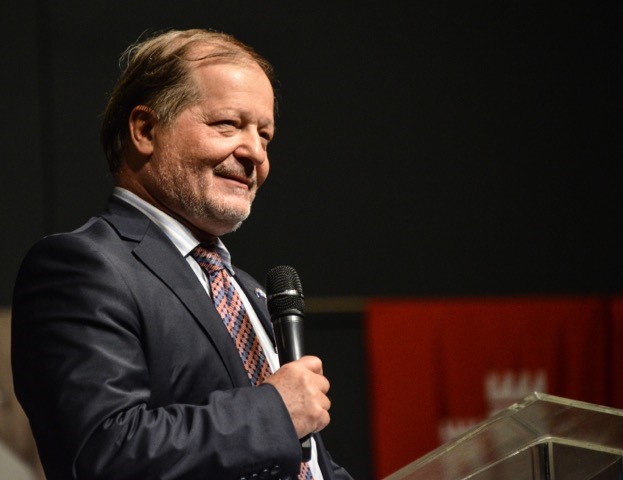Australia/Israel Review
AIR New Zealand: Innovation in the air
Dec 26, 2019 | Miriam Bell

Israel’s political deadlock has frozen activities across numerous areas and the effects are even being felt half a world away in New Zealand. An “Innovation Agreement” that the two countries have been working on for several years can’t be signed off until a new Israeli government is formed.
High hopes are riding on the agreement, so it’s frustrating, acknowledges Israel’s Ambassador to New Zealand, Dr Itzhak Gerberg. “But that’s the price of democracy. The agreement will go ahead though. We are just waiting on the final sign-off from the Israeli Government. Once it does get that sign-off, I’m very optimistic the level of interaction between New Zealand and Israel will increase.”
This would be a good thing as the two countries have much in common and both stand to benefit from working more closely across a range of fields. It would also go some way to further repairing the somewhat troubled relationship New Zealand and Israel have had over recent decades.
Diplomatic relations broke down dramatically back in 2004 when two Israelis, thought to be Mossad agents, were accused of passport fraud. New Zealand received an apology from Israel’s Foreign Minister over the incident and Israel re-established an embassy in Wellington in 2010.
Another rough patch concerned New Zealand’s co-sponsorship of the controversial United Nations Security Council Resolution 2334, under the guidance of former Foreign Minister Murray McCully, in late 2016. Ambassador Gerberg, who had recently arrived in New Zealand to take up his new role, was recalled to Israel for six months following the resolution’s passage.
These days the relationship is good but there’s room for improvement, Ambassador Gerberg told the AIR in a recent interview. “There is so much potential there but we have work to do before we reach a point where we are fully experiencing it.”
In his view, building strong bridges between countries isn’t just a matter for the politicians. “One of the best ways to improve country relationships is through a wide range of bilateral activities across different fields. It has to be about economic endeavours and culture too.”
To that end, the Embassy’s work in New Zealand involves engaging, and communicating, with business people, with different Maori iwi [tribes], with churches, and with other communities around New Zealand.
Carrying out this work over the last few years has left Ambassador Gerberg with the impression that, overall, the general feeling in New Zealand towards Israel is friendly – despite what might be presented in the media.
“Most people understand that Israel is in a very problematic area and that when dealing with Israel it’s important to understand that context. People also realise that Israel is a sophisticated and advanced country, and there tends to be great admiration for Israel’s military and technical achievements.”
Building on this feeling is critical to further developing the New Zealand-Israel relationship. And that’s why the innovation agreement has the potential to be so important.
The agreement would encourage companies and universities from both countries to share and co-operate on research, information, and development. It is possible that it might also encourage them to join ventures that both governments would help pay for.
Negotiations over the agreement have been underway since 2016 and, despite some opposition by fringe groups in New Zealand, it has seen wide support from New Zealand’s business community. The New Zealand Cabinet Economic Development Committee has agreed that New Zealand will sign the agreement.
“The possibilities are broad – there’s so much scope to boost innovation and development in both countries. But, once the agreement is signed, it will come down to the business communities in New Zealand and Israel. The governments provide the framework but filling it up with content comes down to private sector companies.”
When the innovation agreement is eventually signed, it will sit alongside the film co-production agreement that already exists between New Zealand and Israel, signed in 2016.
Supporting these more formal agreements is the network of relationships that Ambassador Gerberg and his predecessors have worked to develop. Of these, the growing relationship with some Maori groups is particularly interesting.
“Many Maori leaders have expressed interest in collaborating with Israel in terms of knowledge and technology, especially in the agricultural area,” Ambassador Gerberg says. “And they love the fact that we have successfully revived Hebrew as a language. That interests them.
“But we don’t want to impose ideas on them. It is about their needs. We can then co-operate with them once they have identified their needs… For example, we could send Maori scholars to study in Israel, as we do with scholars from Pacific nations.”
Going forward, Ambassador Gerberg is positive about improving the ties that bind New Zealand and Israel. There is, however, one particular dream he’d like to see fulfilled sooner rather than later – the establishment of a New Zealand Embassy in Israel.
“I understand that it is a question of money, budget priorities, and so on. But I think actioning it is important. It would definitely increase the volume of tourism and improve economic relations between the two countries.”
Tags: Israel, New Zealand






